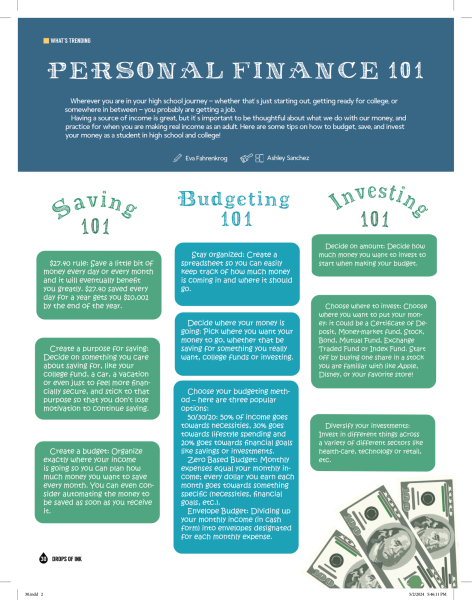Mind The Gap
Reasons for a student taking a gap year can vary; for some students, just needing a change of pace after high school can be enough of a reason. But, in a broader context, the pressure of having to choose what one wants to do at such an early time in their life can be daunting.
The pressure to go to college immediately after high school can be an ever-present feeling, especially in the culture at LHS. With the accumulated stress of deadlines, challenging classes and standardized tests, some students find that they need to do something different after their four years of high school. The choice to take a gap year– though uncommon — is a fully viable option that is open to students after their high school graduation.
A gap year is often (but not always) taken between one’s senior year of high school and freshman year of college. Though a gap year is often seen as a year off, most students will choose to travel, partake in a program of some kind or do some kind of volunteering rather than starting their formal post-secondary education.
Though taking a gap year isn’t as common as going to college immediately after school, they are slowly becoming a more common option for students to take. Approximately 230,000 take them every year, according to Year Out Group, who also reported that 90% of students who intend to go to college after their gap year, do.
Reasons for a student taking a gap year can vary; for some students, just needing a change of pace after high school can be enough of a reason. But, in a broader context, the pressure of having to choose what one wants to do at such an early time in their life can be daunting.
“Making a kid pick at 17 and 18 something that is apparently going to set the trajectory of their life — which I also don’t think is entirely true — that seems so silly,” said Mr. Ryan Ebling, an English teacher.
This comment sums up much of the reason that some students choose to take gap years. Leaving high school, some students feel pressure to decide immediately who they want to be following graduation, and they are not ready to do this.
Continuing, Mr. Ebling added that, “I think, of course, it’s good for people to go to college, but I also don’t think that college is a good fit for everybody.”
Ms. Amy Belstra, head of the College Resource Center, has a glowing opinion on gap years and sees them as a beneficial path for students to take: “You learn so much more about yourself and what you’re capable of because you’re independent,” she said. “You’re navigating a different experience without your parents, and students learn they can do that as well as whatever they’re learning along the way, whether [that’s] another culture or topic or something like that.”
According to the Gap Year Association, an organization that helps pair students with gap-year programs, gap years are appealing and beneficial because they give students life experience outside of high school. By leaving home and placing oneself in a location they aren’t accustomed to, it gives them a chance to mature and have time for personal reflection.
Many students see high school as an obstacle on the path towards college. Senior Katie Stahnke, who plans on taking a gap year in Seoul, South Korea, expressed that high school is stressful, and committing to another four years immediately after it can be less than ideal.
Stahnke will being doing a program through the National Security Language Initiative for Youth (NSLIY) after doing a six-week program through the same organization in South Korea last summer. She hopes that, through this one-year program that she will be doing in lieu of college next year, she will be able to better learn Korean and after college, work for Samsung in Korea.
Despite all the positives that could come from a gap year, there are still stereotypes and concerns around the idea of taking a gap year. One concern from many parents is that taking a gap year will deter their student from going to college after the year is over. After a year without school, it can be easy for parents to foresee their student being enamored by the idea of not having to be held up to the standards of grades and deadlines.
Making a kid pick at 17 and 18 something that is apparently going to set the trajectory of their life — which I also don’t think is entirely true — that seems so silly.
— Mr. Ebling
Though parents’ concerns about their student choosing not to go to school are common, it is often out of fear that their child will not follow the regular track that most students take. Ms. Belstra says that “I think a lot of parents worry that ‘oh if my student doesn’t go to college right away, they’re not going to go. They’re going to love not having to be in school.’ I have never experienced that.”
This fear is often misfounded because a gap year can help a student figure out what they’d like to do in the future, Ms. Belstra suggested.
“A short-term benefit is that you understand why you are going to college. What the educational benefit of that is for you. You learn so much more about yourself and what you’re capable of because you’re independent,” she said.
“Long term, I don’t think everybody should necessarily go to college right out of high school,” Ms. Belstra added.
Hayden Marth, a senior at LHS, is taking a gap semester in order to go to South Africa and do service work, where she will be “volunteering at schools, hospitals, orphanages, and just helping around the communities and learning about the culture.”
Marth said she plans on doing a gap semester because after volunteering on a trip to Cambodia with LHS’s Caring for Cambodia, she found that she loves being able to do service work. After going to a gap-year fair and finding the right program, she decided to take a gap year because she “[hopes she] can learn more about [herself] and see the impact [she] can make.”










